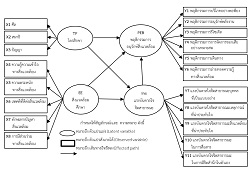MODEL DEVELOPMENT OF TRI SIKKHA FOR ENVIRONMENTAL CONSERVATION
DOI:
https://doi.org/10.14456/nrru-rdi.2020.74Keywords:
Model, Tri Sikkha, Environmental conservation, Environmental education, Inspiration of public mindAbstract
The objectives of this research were to 1) develop Model of Pro-environment Behavior Integrated with Tri Sikkha and Environmental Education (EE) for students, and 2) study exogenous latent variables that effect the endogenous latent variable of Pro-environmental behavior (PEB) through exogenous latent variable inspiration of public mind for environmental conservation (INS) for student in Bachelor’s Degree of ducation program in Nakhon Ratchasima Rajabhat University (NRRU). The population were 5,652 students of Faculty of Education in the 2nd semester, academic year of 2016. The simple random sampling by ballot technique was used for data collecting from 411 students. The research instrument was the online questionnaire reliability statistic is 0.971 and model was validated by using LISREL. Structural Equation model (SEM) was used for model confirmation, which consistent with empirical data regarding 2=164.20, df=112, RMSEA=0.045, RMR=0.0026, GFI=0.94 และ AGFI=0.91.
The results demonstrated that exogenous latent variable of Tri Sikkha (TF) and EE were able to explain the variation of endogenous variable of INS to cause PEB with prediction percentage of 63.00 and they were able to predict INS with percentage of 69.00. The Ins was most influence to PEB with effect of 0.76 and subsequences were TF and EE respectively. The EE was the most effect to INS with 0.60 and subsequence was TF.
References
Chamrernsan, W. (2011). Causal Relationship Model of Psychology and Environmental Education for Global warming Alleviation of undergraduate students in Mahasarakham University. Dissertation, Doctor of Philosophy Program in Environmental Education, Mahasarakham University, Mahasarakham. (In Thai)
Charoensilpa, D. (2011). Development of Model on Environmental Conservation Volunteer Network with Integration of Environmental Education Principle for Global Warming Alleviation. Dissertation, Doctor of Philosophy Program in Environmental Education, Mahasarakham University, Mahasarakham. (In Thai)
Cronbach, L. J. (1951). Coefficient alpha and the internal structure of test. Psychometrika, 16(3), 297-334.
Khachasenee, J. (2015). Ecology for environmental. Bangkok : Chulalongkorn University Printing House. (In Thai)
Khoowaranyoo Thiengkamol, N. (2011). Environment and Development Book1 (4th ed.). Bangkok : Chulalongkorn University Printing House. (In Thai)
Khoowaranyoo Thiengkamol, N. (2011). Holistically Integrative Research (2nd ed.) Bangkok : Chulalongkorn University Printing House. (In Thai)
Khoowaranyoo Thiengkamol, N. (2016). Theory Development with LISREL Research. Bangkok : Chulalongkorn University Printing House. (In Thai)
Koonboonchan Thiengkamol, A. (2013). Causal Relationship Model of Global Warming Alleviation Integrated with Four Noble Truths and Psychological State. Dissertation, Doctor of Philosophy Program in Environmental Education, Mahasarakham University, Mahasarakham. (In Thai)
Payutto, P. (2004). Buddha-Dharma Extend Edition (12th ed.). Bangkok : mcupress. (In Thai)
Phra Dhamma Mongkol Yarn. (2016). Dharma from heart. Bangkok : Willpower Institute. (In Thai)
Pimdee, P., Thiengkamol, N., & Thiengkamol, T. (2012). Psychological Trait and Situation Affecting through Inspiration of Public Mind to Energy Conservation Behavior of Undergraduate Student. Mediterranean Journal of Social Sciences, 3(3),81-88.
Prasertsri, N., Thiengkamol, N., & Thiengkamol, T. (2013). Causal Relationship Model of Learning Behavior of Information Technology. European Journal of Scientific Research, 104(3), 475-487.
Yamamoto, S. & Kuwahara, V. S. (2009). How does Buddhism Contribute to the Environmental Problems?. The Journal of Oriental Studies, 19, 71-80.
Yamamoto, S., & Kuwahara, V. S. (2008). The Middle-way of Buddhism and Environmental Problems. The Journal of Oriental Studies, 18, 89-101.
Yamane, T. (1973). Statistics. An Introductory Analysis (3rd ed.). Tokyo : Harper International Edition.





